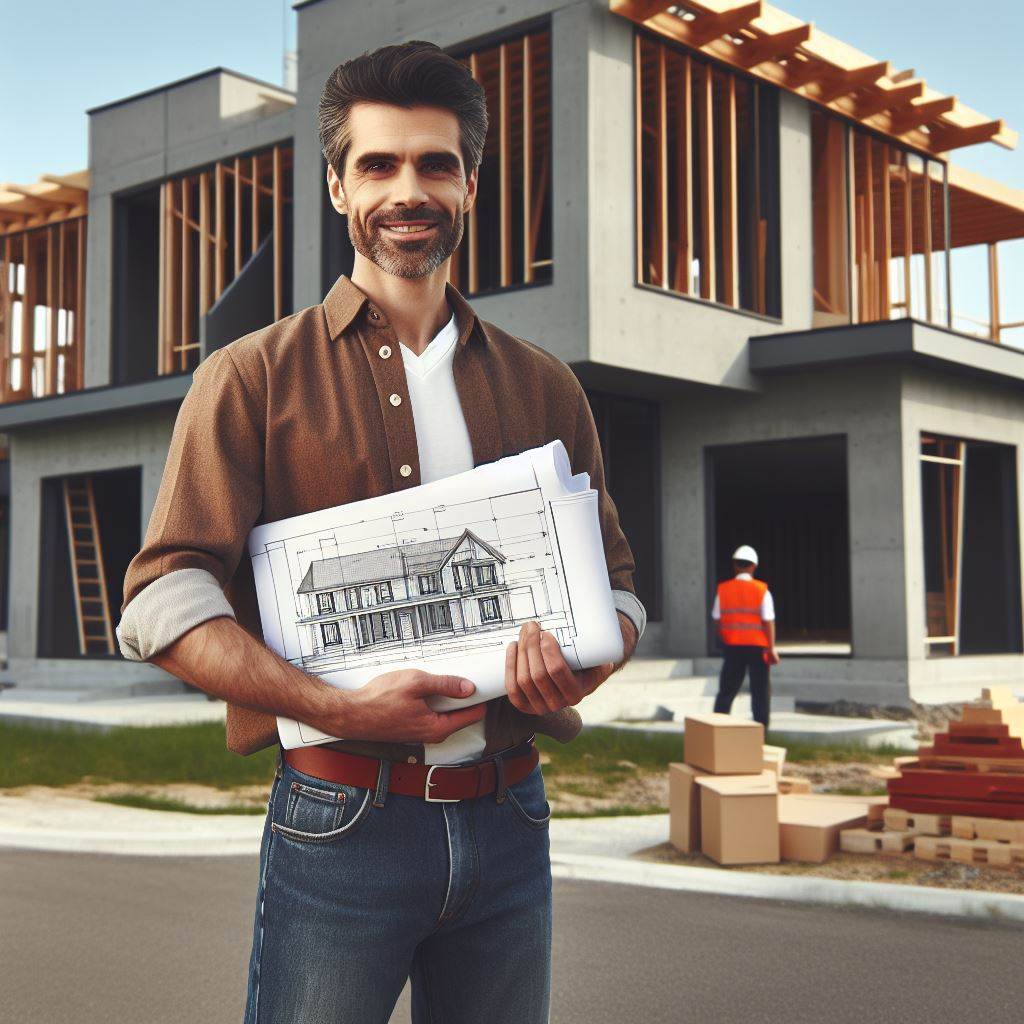Introduction
Home construction is an exciting venture, but it’s crucial to navigate it legally to avoid any pitfalls.
Understanding the legal aspects is essential as it safeguards your investment and ensures compliance with regulations.
This blog post will discuss the importance of obtaining permits and licenses, hiring licensed professionals, and having proper contracts in place.
Additionally, it will also cover the significance of construction insurance and the need to comply with building codes.
Obtaining the necessary permits and licenses is pivotal to ensure that your construction project meets legal requirements and standards.
Failure to do so can result in hefty fines or even legal action.
Hiring licensed professionals, such as architects and contractors, is crucial.
They possess the expertise and knowledge to navigate the legal complexities of home construction, ensuring quality and adherence to regulations.
Having proper contracts in place protects both parties involved in the construction process.
It outlines the scope of work, timelines, and payment terms, preventing any misunderstandings or disputes.
Construction insurance is essential to protect your investment from unforeseen circumstances, such as accidents or property damage.
It provides financial security and peace of mind during the construction process.
Complying with local building codes is essential to ensure the safety and structural integrity of your construction project.
Adherence to these codes guarantees a legally sound and structurally sound home.
In essence, understanding and adhering to legal tips for home construction is vital.
It avoids legal complications, protects your investment, ensures quality work, and promotes safety throughout the process.
Stay tuned for our upcoming sections, where we will delve deeper into each of these topics.
Research and Hiring
Researching local building codes and regulations
Researching local building codes and regulations is crucial when embarking on a home construction project.
Building codes vary from state to state and even between cities, and it is important to be aware of these regulations to avoid any legal issues down the line.
Importance of staying updated with current regulations
Staying updated with current regulations is equally vital. Building codes are regularly revised and updated to ensure safety standards are adhered to.
Failing to comply with the latest regulations can result in fines, delays, or even having to redo certain aspects of the construction.
Online resources and local government websites for information
Online resources and local government websites are excellent places to find information on building codes and regulations.
These websites often provide detailed guidelines on various construction projects, including permits, inspections, and safety requirements.
They can also provide downloadable forms and applications.
Hiring a licensed and reputable contractor
However, researching and understanding the legalities is only one aspect of home construction.
Hiring a licensed and reputable contractor is equally important.
A good contractor will not only ensure compliance with building codes but also deliver high-quality workmanship.
Checking contractor’s license and insurance
Before hiring a contractor, always check their license and insurance.
Any reputable contractor will have the necessary permits and insurance coverage to protect themselves and their clients.
Valid licenses and insurance also provide peace of mind that the contractor has met the required legal standards.
Seeking recommendations and reading online reviews
Seeking recommendations from trusted sources is a valuable way to find a reliable contractor.
Friends, family, and colleagues who have had successful home construction experiences can provide valuable insights and suggestions.
Additionally, reading online reviews can give an idea of a contractor’s reputation and customer satisfaction levels.
To summarize, conducting thorough research on local building codes, staying updated with regulations, and finding a licensed and reputable contractor are essential steps for a legal and successful home construction project.
By following these tips, homeowners can ensure that their construction project complies with the law and meets their expectations.
Read: Managing Change Orders in Construction
Written Contracts
When embarking on a home construction project, one of the most crucial aspects is having a written contract with the contractor.
This document serves as a legal agreement between both parties, outlining the responsibilities, expectations, and rights of each party involved.
Importance of Having a Written Contract with the Contractor
A written contract provides protection and clarity for both the homeowner and the contractor.
It ensures that everyone is on the same page regarding the project details and can help avoid misunderstandings or disputes that may arise during the construction process.
Clearly Defining the Scope of Work and Specifications
The contract should include a detailed description of the scope of work and specifications.
This includes the exact tasks to be performed, materials to be used, and any specific requirements or preferences the homeowner may have.
By clearly defining these aspects, there is less room for misinterpretation or deviation from the desired outcome.
Establishing a Timeline and Payment Schedule
A written contract should also establish a timeline for the project, including start and completion dates.
This timeline gives both parties a clear understanding of the expected duration of the construction process.
Additionally, a payment schedule should be outlined in the contract, specifying when and how much money will be paid to the contractor throughout the project.
Including Provisions for Unexpected Changes or Delays
Home construction projects often encounter unexpected changes or delays due to various factors such as weather conditions, material availability, or unforeseen issues.
It is essential to include provisions in the contract that address these situations.
This can include a change-order process, allowing for modifications to the original scope of work, and cost adjustments based on the changes made.
Contingency Plans for Unforeseen Circumstances
In addition to addressing changes or delays, a written contract should also include contingency plans for unforeseen circumstances.
For example, if the project encounters a significant issue that prevents its completion, the contract should outline the steps to be taken and the potential outcomes, such as termination or renegotiation of the contract.
Overall, having a written contract is crucial for any home construction project.
It protects both the homeowner and the contractor by clearly defining the scope of work, establishing a timeline and payment schedule, and addressing unexpected changes or delays.
By setting clear expectations and responsibilities from the start, a written contract can contribute to a successful and stress-free construction experience.
Read: Safety Regulations in Construction Sites
Permits and Inspections
Building a home is an exciting and fulfilling experience, but it is essential to follow legal guidelines to ensure a smooth construction process and avoid any legal complications or penalties.
One crucial aspect of home construction is obtaining the necessary permits and scheduling regular inspections.
Understanding the Permit Requirements for Home Construction
Before starting any construction project, whether it’s building a new home or making significant renovations, it is crucial to understand the permit requirements.
These permits are necessary to ensure that the construction complies with local building codes, zoning regulations, and safety standards.
Each municipality may have specific permit requirements, so it’s vital to research and understand the regulations in your area.
Different Types of Permits Needed for Specific Projects
Depending on the nature of your construction project, you may need different types of permits.
Common permits required for home construction include building permits, electrical permits, plumbing permits, mechanical permits, and demolition permits.
Each type of permit focuses on different aspects of the construction process and ensures that the work is done safely and up to code.
How to Obtain the Necessary Permits from Local Authorities
Obtaining the necessary permits involves submitting detailed plans, including architectural drawings and engineering blueprints, to the local building department.
You will typically need to provide information about the project’s scope, materials used, and estimated timelines.
Additionally, there are fees associated with permit applications, which vary based on the project’s size and complexity.
It’s important to fill out the permit applications accurately and provide all required documentation to avoid delays or rejections.
Importance of Scheduling Regular Inspections During Construction
Throughout the construction process, it’s crucial to schedule and complete regular inspections.
These inspections are conducted by local building inspectors to ensure that the construction adheres to building codes, safety regulations, and quality standards.
Inspections may cover different stages of construction, including the foundation, framing, electrical wiring, plumbing, and final detailing.
By passing these inspections, you can have confidence that your home is being built correctly and safely.
Ensuring Compliance with Building Codes and Regulations
Complying with building codes and regulations is not only essential for legal reasons but also for the safety and quality of your construction project.
Building codes exist to protect homeowners and ensure that structures are safe, energy-efficient, and structurally sound.
Non-compliance with codes can lead to fines, costly corrections, or even the halting of construction until issues are resolved.
By following the prescribed codes and regulations, you can ensure that your home is built to last and meets the necessary legal standards.
Avoiding Potential Legal Issues and Costly Penalties
By obtaining permits and scheduling inspections, you can avoid potential legal issues and costly penalties.
Failure to obtain the required permits can result in fines or even forced demolition of the structure.
Similarly, failing inspections could lead to delays, additional expenses, or the need to redo specific aspects of the construction.
It’s crucial to stay diligent throughout the construction process to maintain compliance and avoid any legal complications.
In fact, understanding and complying with the permit requirements for home construction, as well as scheduling regular inspections, are fundamental legal tips for any homeowner undertaking a construction project.
By following these guidelines, you can ensure that your construction project is legal, safe, and hassle-free.
Remember to research your local regulations, obtain the necessary permits, and schedule inspections to avoid potential legal issues and costly penalties.
Read: Risk Management in Construction Law

Liability and Insurance
When it comes to home construction, there are several liability risks that need to be addressed.
Whether you are the homeowner or the builder, understanding these risks and having adequate insurance coverage is crucial.
Let’s take a closer look at the potential risks and the insurance options available.
Liability Risks During Home Construction
During the construction process, there is always a risk of potential injuries to workers or visitors on the site.
Builders should ensure that safety protocols are in place to minimize the chances of accidents and injuries.
Proper training and supervision can help reduce liability risks associated with worker injuries.
Potential Injuries to Workers or Visitors
Workers may face hazards such as falls, electrical shocks, or injuries from heavy machinery.
Visitors to the construction site, such as inspectors or potential buyers, can also be at risk.
It is essential to have warning signs, restricted access areas, and safety barriers to protect everyone.
Damage to Neighboring Properties or Infrastructure
Construction activities can sometimes lead to damages to neighboring properties or existing infrastructure.
Excavations, vibrations, or falling debris are common causes of such damages.
Builders should take necessary precautions to prevent harm and have liability coverage to address any damages.
Adequate Insurance Coverage for Construction Projects
Having appropriate insurance coverage plays a significant role in mitigating risks and protecting all parties involved.
Builder’s risk insurance is essential to cover any potential property damage during construction.
This type of coverage can protect against risks like fire, theft, vandalism, or natural disasters.
Builder’s Risk Insurance for Property Damage
Builder’s risk insurance typically covers the structure, materials, and equipment used in the construction project.
The policy can also include coverage for unexpected expenses or delays due to covered perils.
It is crucial for both homeowners and builders to ensure that this insurance is in place before starting the project.
Workers’ Compensation for Potential Injuries
Workers’ compensation insurance is vital for construction projects to protect workers in case of injuries or accidents.
This coverage provides medical benefits and lost wages to injured workers.
It also helps shield employers from lawsuits related to workplace injuries.
In short, liability risks are inherent in home construction projects, and having the right insurance coverage is essential.
Adequate protection can prevent significant financial losses and legal complications.
It is important to discuss these risks with your builder or insurance provider and ensure that you have the appropriate coverage before construction begins.
By addressing liability concerns and implementing necessary safety measures, you can make your home construction project a smooth and secure process.
Read: Construction Liens: Protecting Your Rights
Dispute Resolution
Addressing common disputes that may arise during construction
One of the most common issues that can arise during home construction is the quality of workmanship or materials used.
It is essential for homeowners to address this concern promptly.
Delays in project completion is another dispute that can cause frustration.
Homeowners should communicate openly with contractors to understand the reasons behind the delays and find a suitable resolution.
Suggesting methods of resolving disputes without litigation
Open communication and negotiation should be the first approach in resolving disputes.
Homeowners should have a meeting with their contractor to discuss the issues and seek a mutually agreeable solution.
If the problem cannot be resolved through negotiation, seeking mediation or arbitration can be an alternative option.
These processes can help parties reach a fair resolution without going to court.
Steps to address disputes during home construction
- Open communication and negotiation with the contractor: Engage in regular and transparent communication with the contractor to address any concerns or disputes promptly.
Keep all conversations documented for future reference if needed. - Seek professional advice: If negotiations fail, consult with a construction lawyer or a professional in the field to understand your rights and explore possible solutions.
- Mediation: Consider mediation as an option. A neutral third party can facilitate discussions between the homeowner and the contractor to find a mutually beneficial resolution.
- Arbitration: Arbitration can be an alternative to litigation. It involves a neutral arbitrator who hears both sides and makes a binding decision.
- Review the contract: Thoroughly review the construction contract to understand the procedures for dealing with disputes and the applicable laws in your jurisdiction.
- Document everything: Keep detailed records of all communication, contracts, invoices, and photos of the construction process.
This will help support your claims in case of a dispute. - Understand warranty obligations: Familiarize yourself with the warranty provided by the contractor to address any defects or issues that may arise after the construction is complete.
- Consider home inspections: Engaging a professional home inspector at various stages of the construction process can help identify potential problems early on and mitigate disputes.
- Avoid payment disputes: Ensure that all payment terms are clearly outlined in the contract. Pay according to the agreed-upon milestones and keep records of all payments made.
- Finalize any changes through written amendments: If there are any changes to the original construction plan, make sure to document them through written amendments to avoid future misunderstandings.
- Be proactive and engaged throughout the construction process: By staying involved and informed, homeowners can address issues promptly and prevent disputes from escalating.
Resolving disputes during home construction can be challenging, but with open communication, negotiation, and an understanding of the available options, homeowners can ensure a satisfactory outcome while avoiding costly litigation.
Conclusion
Building a home requires legal awareness. Compliance with regulations is crucial. Seek legal counsel for specific concerns.
Your dream home deserves diligent attention. Understand zoning laws before construction begins. Avoid costly mistakes by consulting legal experts.
Construction permits are non-negotiable. Adhere to safety standards for liability protection. Document every step of the construction process.
Keep records of contractor agreements and payments. Address any disputes promptly and legally. Prioritize quality materials to avoid future issues.
Insist on thorough inspections throughout construction. Legal expertise ensures a smooth home-building journey.
Don’t underestimate the importance of legal guidance. Protect your investment with proper legal precautions. Consult professionals for peace of mind.
Your home is worth the effort. Build with confidence, backed by legal knowledge.




